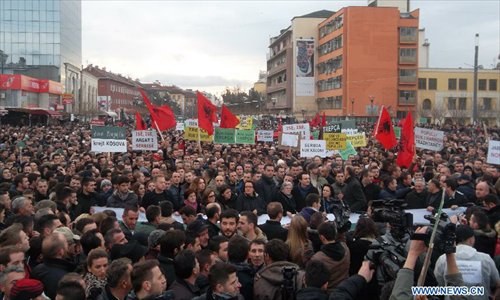HOME >> WORLD
Anti-gov't protest escalates in Kosovo
Source:Xinhua Published: 2015-1-25 9:02:14

Local people attend an anti-government protest in Pristina, Kosovo, on Jan. 24, 2015. Over 10,000 people attended the anti-government protest in Pristina on Saturday, which ended up with a violent conflict bewtween protesters hurling stones in the government building and riot police dispersing them with tear gas. Photo:Xinhua
Over 10,000 people attended the anti-government protest in Pristina on Saturday, which ended with a group of protesters hurling stones in the government building and forced police to use tear gas in dispersing them.
At least three police officers got injured from the violence, while a number of violent protesters have been arrested.
The protest was called by the opposition Self-determination Movement following a statement of a Serbian minister in the Kosovo authorities which was regarded insulting to mothers of missing persons.
The statements of the Minister for Communities and Returns, Aleksandar Jablanovic, concerned an incident when a bus with about 40 displaced Serbs was stoned during a protest of Albanian mothers of missing persons in Gjakova/Djakovica on Jan. 6.
Jablanovic called the women protesters "beasts" for preventing Serbs from visiting their burnt out houses. He apologized for the remarks two weeks later, but it showed to be insufficient in preventing new protests which have been taking place all over Kosovo.
Speaking to the crowd the leader of Self-determination, Albin Kurti, set an ultimatum to "Prime Minister" Isa Mustafa to dismiss Jablanovic from his cabinet or resign himself.
"We give 48 hours deadline to Prime Minister Mustafa, until 4 p.m. on Monday to dismiss Minister Jablanovic, or will gather here again on Tuesday at noon to demand his resignation," said Kurti, cheered loudly by the crowd.
Initially the protest was calm, but by the end, a group of protesters started to hurl stones at the government building, which suffered a significant damage. For almost two hours the police was passive, but then decided to disperse the crowd with tear gas.
Protesters damaged also a bar nearby the government building and in the incidents three police are reported injured.
"Yes, three police officers are so far injured," Daut Hoxha, the spokesperson of the Kosovo Police, told media.
Nusrete Kumnova, a mother of a missing son from 1999 war, criticized the government for ignoring their calls for dismissing Jablanovic.
"Shame for the current government and for all after-war governments! 16 years after we still need to look after our loved ones," said Kumnova.
Jablanovic is a senior member of Srpska List, which is currently the main Serbian political party in Kosovo. Since December 2014, Srpska List has been a partner in the ruling broad coalition of the two major Albanian parties in the Kosovo authorities.
Speaking on the protest, "Prime Minister" Mustafa said on Saturday that Jablanovic is not the biggest problem for Kosovo.
He supported the right for protest, but insisted that "all the problems can be solved in the framework of the government program that Kosovo has."
The second topic mentioned in the protest is the biggest mine complex in Kosovo "Trepca" after the Kosovo assembly failed to adopted a law on the status of the mine. Instead the assembly adopted a law on public enterprises, but excluded Trepca complex and the authorities said that Trepca requires a special law, in which the government will work on.
The complex of lead, zinc and silver mines which lies in northeast of Kosovo, has long been the subject of political dispute. The mines are split along ethnic lines. In the northern part of the complex ethnic Serbs are employed, and it's run by Belgrade, while the southern part employs Kosovo Albanian workers and is under the control of Pristina.
Kosovo unilaterally declared independence in 2008. Serbia categorically refuses to recognize its independence.
Kurti said that apart of Jablanovic's dismissal, Mustafa should provide a draft-law for Trepca by Monday, otherwise the protests will continue.
Posted in: Europe